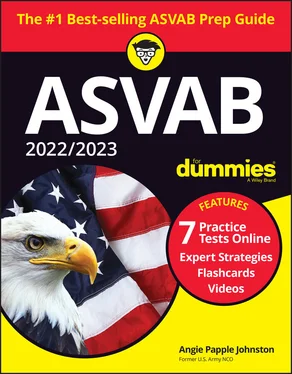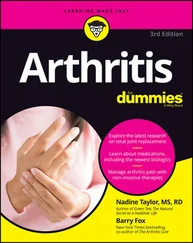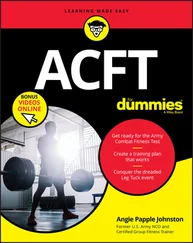(A) cringed
(B) laughed
(C) shouted
(D) endured
The signal phrase in the question is “as if,” which is very similar to “like.” Knowing that, what’s the most likely answer? If you saw a ghost, you probably wouldn’t laugh, shout, or endure. (I’d run.) The most correct answer is Choice (A), cringed, because that’s far more likely to be your response than any of the other choices are.
One of these things is not like the other: Ruling out wrong answers
One of the most successful ASVAB strategies involves ruling out answers that aren’t likely to be correct before settling on the one you think is right. When two answer choices mean almost the same thing, or when some choices don’t match the prefix, suffix, or root word, you can cross them off as possibilities.
 Inhabit most nearly means
Inhabit most nearly means
(A) vacate.
(B) reside.
(C) depart.
(D) leave.
Choices (A), (C), and (D) are all very similar in meaning, leaving only Choice (B), reside, as the clear front-runner.
On the ASVAB, your choices aren’t likely to be this obvious, but you may be able to rule out two choices and give yourself a 50-50 chance of finding the correct answer.
 Deform most nearly means
Deform most nearly means
(A) cure.
(B) heal.
(C) contort.
(D) tragedy.
Choices (A) and (B) are essentially the same, so you can eliminate those two. Now look at the prefix, de-, and compare it to what you find in Table 4-2or other words that begin with the same prefix. De- means “away from.” In Table 4-4, you can see that the root word form means “shape.” That means Choice (C), contort, is the right answer for this question. (Combining ASVAB test-taking strategies gives you an extra edge!)
Mind filling in? Replacing the word with the answer choices
When you encounter a Word Knowledge question that asks you to define a word in a sentence, you may find that swapping out the underlined word with each of your choices leads you to the correct answer.
 The CDC hasn’t been able to identify the pathogen that these people ingested before turning into zombies.
The CDC hasn’t been able to identify the pathogen that these people ingested before turning into zombies.
(A) person
(B) carrier
(C) event
(D) bacteria
Replace pathogen with person, carrier, event, and bacteria. (The word ingested is a big clue. The words person, carrier, and event just don’t make sense in the sentence.)
This strategy can work in conjunction with other strategies, too:
 Maria was worried that the cockroaches in the apartment would have a deleterious effect on her daughter’s health.
Maria was worried that the cockroaches in the apartment would have a deleterious effect on her daughter’s health.
(A) helpful
(B) harmful
(C) erasing
(D) backward
Replace deleterious with each of the answer choices. Choice (B), harmful, is the only one that makes sense — especially because the sentence says, “Maria was worried,” which shows you that the correct answer won’t be something positive.
Say what? Parts of speech matter
When you see a Word Knowledge question that asks you to define a word in a sentence, you might be able to weed out one or two incorrect choices by knowing the parts of speech. Table 4-6lists the eight parts of speech, notes what roles they play in sentences, and gives you some examples.
TABLE 4-6Parts of Speech
| Part |
Role |
Examples |
| Noun |
Names a person, place, thing, or idea |
Mr. Hall, lawyer, United States, suffix |
| Verb |
Expresses an action or state of being |
to write, to read, to eat, to play, to be |
| Adjective |
Describes a noun |
green, sleepy, hungry, fast, beautiful |
| Adverb |
Modifies a verb, adjective, or another adverb |
tremendously, very, cautiously, dangerously, sneakily |
| Pronoun |
Replaces a noun |
he, she, they, it, this, I, you |
| Preposition |
Relates a noun or pronoun to another word |
in, on, around, after, under |
| Conjunction |
Connects clauses to sentences |
and, but, if |
| Interjection |
Expresses emotions or feelings |
cool, awesome, holy cow, uh-oh, eek |
 A suffix can tell you what part of speech a word is, so when you encounter a word you don’t know, you’ll be able to eliminate possible answer choices that you do know by looking at the suffixes.
A suffix can tell you what part of speech a word is, so when you encounter a word you don’t know, you’ll be able to eliminate possible answer choices that you do know by looking at the suffixes.
Suffixes are usually only part of nouns, verbs, and adjectives. If the ASVAB asks you to define analogous, but you don’t know what it means, you can use your knowledge of the suffix to help you rule out answers that don’t make any sense. Because the suffix - ous typically modifies nouns and turns words into adjectives, you know that the correct answer probably won’t be a noun.
 Analogous most nearly means
Analogous most nearly means
(A) inclusive.
(B) danger.
(C) write.
(D) comparable.
Of those answer choices, inclusive and comparable are the only adjectives. Danger is a noun, and write is a verb. You can rule out Choices (B) and (C) to make a more educated choice — and improve your chances of answering the question correctly — if you know that the suffix -ous usually refers to adjectives. Choice (D) is correct here; analogous means comparable in certain respects, especially when it clarifies the relationship between two things that are being compared (“The relationship between a drill sergeant and a new recruit is analogous to the relationship between a hungry fish and a worm on a hook”).
 Cameron knew that the only viable option was to invest 10 percent of his savings.
Cameron knew that the only viable option was to invest 10 percent of his savings.
(A) succeed
(B) glowing
(C) reasonable
(D) life
The underlined word, viable, describes Cameron’s option; option is a noun in this sentence, so that makes viable an adjective. Look through the answer choices and figure out what part of speech each word is. Choice (A), succeed, is a verb because it describes an action (the action of succeeding). Choice (B), glowing, is an adjective because it modifies a noun (for example, “the glowing candle”), so that’s a possible answer. Choice (C), reasonable, is also an adjective because it modifies nouns (as in, “That’s a reasonable alternative”), so that’s another option. Choice (D), life, is a noun (and it wouldn’t make any sense in this sentence), so it’s off the table.
Choices (B) and (C) are the most likely of the four to be correct. If you haven’t tried it yet, replace viable with each choice. You’ll see that Choice (C), reasonable, makes the most sense in the sentence.
Читать дальше

 Inhabit most nearly means
Inhabit most nearly means A suffix can tell you what part of speech a word is, so when you encounter a word you don’t know, you’ll be able to eliminate possible answer choices that you do know by looking at the suffixes.
A suffix can tell you what part of speech a word is, so when you encounter a word you don’t know, you’ll be able to eliminate possible answer choices that you do know by looking at the suffixes.










